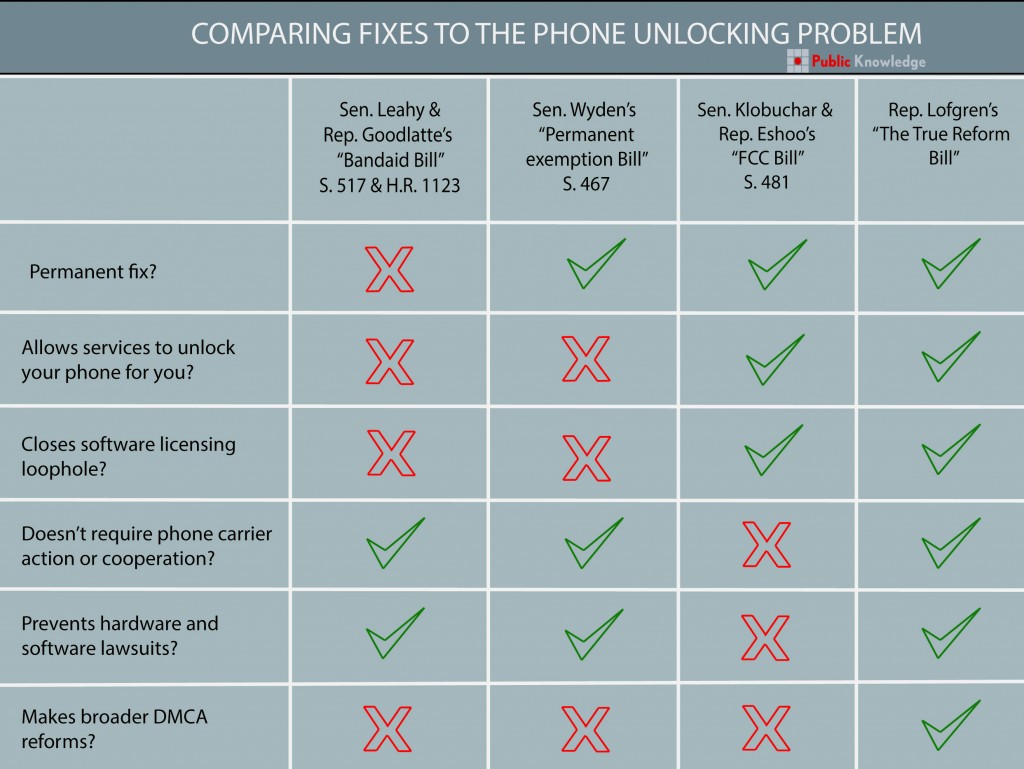Today Congress introduced yet another bill to address the recent ban on cell phone unlocking, which prevents cellphone owners from using their phones on different wireless carriers. The Digital Millienlium Copyright Act (DMCA) forbids the of circumvention of digital lock,s but givae the Librarian of Congress the ability to grant exceptions every 3 years. In the past these exceptions have allowed blind users to break digital locks on ebooks to convert them into more accessiable formats, allowed teachers to break the digital locks on DVDs in order to gather video clips for use in class, and allowed librarians to break locks on old software for the purposes of archiving them, among other exemptions. In fact an exemption to allow cellphone users to unlock their phone in order to use their phone on a different carrier was granted in 2006 and 2009 but not in 2012, turning th eprevioulsy legal act of unlocking your phone into an ilegal one in January of 2013.
The backlash to this move was widespread and lead to a We The People petition that foced a response from the Whitehouse, which ended up siding with petioners and called on Congress to introduce legislative fixes to solve the problem. Several laws have since been introduced to tackle this problem but many of them with major problems. For example one bill, introduce by Senator Leahy, simply reinstates the 2009 cellphone unlocking exemptios for the current three year term, leaving the entire mess to be refought againg at the 2015 hearings. Other bills instate a permant fix for cellphone unlocking but don’t address this issue as it pertains to other digital locks, or allow cellphone owners to unlock their cellphones but not for third parties to perform the unlocking as a service to the owner. Public Knowledge put together a wonderful little table illustrating the differences between some of these bills (see below).

The Unlocking Technology Act of 2013
Today Rep. Zoe Lofgren introduced what looks like a comprehensive solution not only to the cellphone unlocking problem, but to the greater issue of DMCA digital lock exemptions. H.R. 1892,The Unlocking Technology Act of 2013, does several important things.
First the bill gives a permanent DMCA exemption to cellphone unlocking, both the act of doing so as well as tools and services that assist in the process. This straightforward loophole-free provision takes care the entire cellphone unlocking problem but the bill doesn’t stop there.
The Unlocking Technology Act also tackles the broader problems surrounding the DMCA anti-circumvention provsions by stating that only circumvention that leads to actual copyright infringement will be in violation of the DMCA. Currently breaking a digital lock on a DVD for the purposes of making a perfectly legal personal copy to you home computer is illegal by the fact that the lock was circumvented. This new bill would protect all actions and tools that break digital locks for non-infringing purposes. This common sense approach would mean that users would not longer have to seek exemptions from the Lirarin of Congress every three years and would be allowed to circumvent digita locks as long as they were doing so for purposes that did not infringe on copyright. This move would be a huge step forward for DMCA reform and is the primary piece that distuinguishes this bill from other phone unlocking bills.
Finally this bills addresses objections from the RIAA, and other content industry groups, that argue that amending the DMCA violates already raitified intertnational trade agreements. The bill states…
The President shall take the necessary steps to secure modifications to applicable bilateral and multilateral trade agreements to which the United States is a party in order to ensure that such agreements are consistent with the amendments made by this Act.
In essence, previous trade agreements do not preempt domestic law, and it is up to the executive branch to negoiate changes to these internatial agreements to bring them in line with DMCA amendments. In reality this adjustment should be easy since it was the United States, not our trade partners, that pushed for strict copyright provisions in the trade agreements in the first place.
CONCLUSION
This bill is the first in the slew of cellphone unlocking bills to actually adresses core problems with the DMCA. It is promising to see bipartisan support behind the bill and it’s passage would be a major victory for copyright reform advocates. Allowing Americans to circumvent digital locks for legal reasons would benefit a wide variety of groups and would encourage innovation in areas that are currently in a legal area.
Update: Check out other articles on this story from Public Knowledge, TechDirt, EFF, Tech Liberation, and Ars Technica.

No Comments